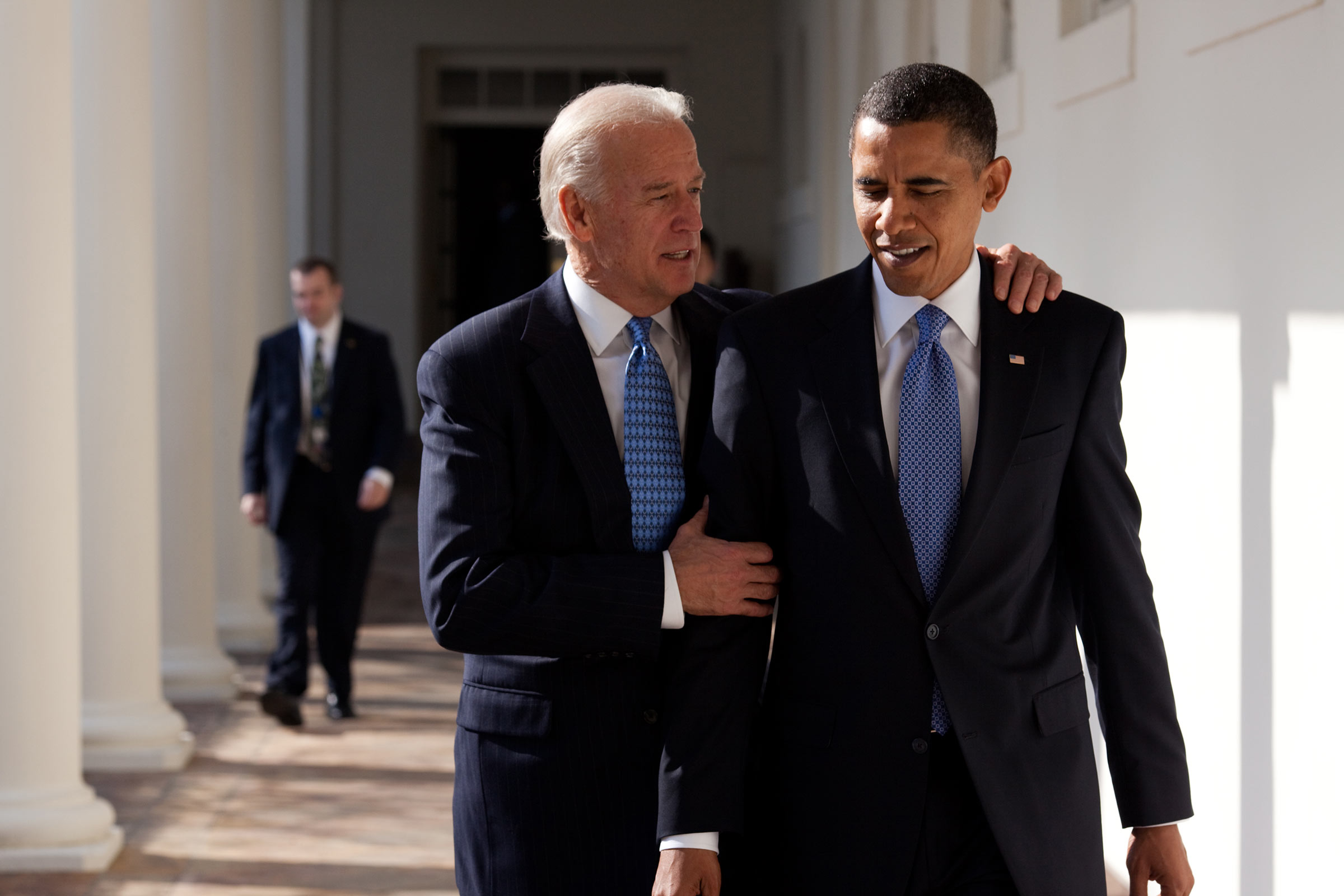Most political observers sensed that former US President Barack Obama was keeping a close eye on the Democratic primaries with a view to engineering events leading up to this year’s convention. Months ago they had heard rumblings about his determination to prevent Senator Bernie Sanders from getting the nomination. In early March, the day before Super Tuesday, Obama demonstrated his capacity to pull all the necessary strings by arranging for all the moderate candidates to drop out of the race in favor of Biden, according to reports. Some judged that ploy to be not terribly democratic while admitting that it was exceedingly Democratic.
Bernie Leaves a Path Behind Him
Obama maintained a certain level of mystery — call it false objectivity — by not endorsing Biden himself after encouraging the other candidates to do so. Many suspected that if he hadn’t endorsed Biden, it meant that he would have preferred a different candidate than his former vice president. But when the others failed to gain any traction, Obama, still working in the wings, began setting things up for Biden’s emergence as the presumptive nominee for the November election. Then on cue, as soon as Sanders gave up the battle, Obama stood up to endorse Biden.
In times of a pandemic, Obama delivered his endorsement in a scripted video. It began with effusive praise of real people: “[M]edical professionals who are putting their lives on the line to save others” and “workers taking risks every day to keep our economy running.” He completed the list by mentioning “everyone who is making their own sacrifice at home with their families, all for the greater good.”
Here is today’s 3D definition:
The greater good:
The needs of society as a whole, which, when effectively addressed by living politicians, invariably turns out to be a response to the desires of the wealthy few
Contextual Note
To dispel the idea that Obama’s appreciation of Biden’s capacity to govern was tepid at best, the former president heaped effusive praise on the candidate’s “knowledge and experience, honesty and humility, empathy and grace.” Of the four qualities mentioned, the first two appeared truthful, which made the last four seem as though they might be as well.

Most people recognize that Biden has accumulated firsthand knowledge of much of what goes on in government and, after 40 odd years of service, has acquired experience. As for honesty, if you don’t count lying or corruption as dishonesty, the case could be made. No one doubts that Biden lies far less often than President Donald Trump. And Biden’s corruption is definitely less shocking than Trump’s since. “Converting campaign contributions into legislative favors and policy positions,” as Zephyr Teachout writes in an op-ed for The Guardian, happens to be the standard form of corruption in Washington. This contrasts with a much more spectacular form of corruption dear to Trump, who uses political power to further his and his family’s business interests.
Speaking of families, Biden’s son, Hunter, has done well, far beyond his personal merits, throughout his career in ways that wouldn’t have been possible without his father’s influence. In the light of these known facts, wouldn’t it have been more honest of Obama not to insist on Biden’s honesty? As for humility, doesn’t Obama remember when Biden, standing next to Senator Elizabeth Warren in a debate not so long ago, claimed the credit for her signature achievement: the creation of the Consumer Financial Protection Bureau?
Obama also lauds Biden as “the one asking what every policy would do for the middle class and everyone striving to get into the middle class.” Warren has now endorsed Biden, but The Washington Post quoted her a year ago describing her battle with him concerning the famous bankruptcy bill: “I got in that fight because [families] just didn’t have anyone, and Joe Biden is on the side of the credit card companies.” As The Post explains, people began calling Biden “the senator from MBNA,” the name of “a large credit card company then based in Delaware that gave a substantial amount of money to Biden’s campaign coffers over the years.”
Obama then touts Biden’s platform as “the most progressive platform of any major-party nominee in history.” But has anyone seen his platform? And historians may note that, as progressive platforms go, it falls far short of Lyndon Johnson’s, the promoter of the “Great Society.” Obama does go on to cite this incontestable fact: that “the Republicans occupying the White House and running the US Senate are not interested in progress. They are interested in power.” Does he intend to suggest that Democrats aren’t interested in power? Fortunately, he doesn’t get into that issue.
His endorsement video illustrates the inspired rhetorical style he is known for. But most of its contents were, at best, an exaggeration of the truth. This demonstrates the principle that now appears to govern the logic of the two-party system in the US. Whatever one party does excessively — however undemocratic, immoral and at times criminal — the other party can allow itself to do “with moderation” and call it virtuous. This proves to Americans that voting for their party would be the better choice. It enables Democrats to call their more moderate lies the “truth,” simply because they can’t rival Trump’s blatant lies. It also excuses the party for practicing ordinary corruption, rather than the kind of barely disguised scams that real estate magnate Donald Trump has so consummately engineered.
Finally, because Democrats sculpt their platform according to the desiderata of millionaires in the suburbs rather than jet-set billionaires, they feel comfortable calling themselves the working-class party.
Historical Note
At the core of Barack Obama’s appeal is an inspiring call for unity: “We need Americans of good will to unite in a great awakening against a politics that too often has been characterized by corruption, carelessness, self-dealing, disinformation, ignorance, and just plain meanness.”
Some may read Obama’s evocation of “a great awakening” as a subtle nod to evangelicals, some of whom have lost patience with Donald Trump as a not very Christian role model. Those familiar with US history will recognize the “great awakening” as a reference to three significant moments of religious revival in US history. The first took place in English colonies in the early 18th century as a response to the rationalism that had taken root in London and Paris during the European Enlightenment. The second followed the establishment of the new nation at the end of the century, looking for heavenly guidance. The third arose in the 1850s but was eclipsed by the Civil War.
Obama’s nod may also be directed to at least some progressives who, he believes, may have found Bernie Sanders’ invocation of “revolution” too extreme. All progressives are hankering for some kind of radical renewal of the political culture, but the idea of an “awakening” may sound more reasonable than Sanders’ revolution.
Obama is a master rhetorician. He knows how to evoke phrases that evoke positive feelings in his audience. He did it in 2008 with the simple ideas of “hope” and “change.” And by delivering very little change as president, one could say that he at least kept the hope for future change alive. His “great awakening” trope is clearly just as perfunctory and superficial as hope and change, but recommending a great awakening, with its Puritanical associations, may turn out to be a dubious gambit in his effort to seduce progressives.
The former president wants to restore unity. He implores Americans “to unite in a great awakening,” but his call to action lacks any sense of a common goal. Instead of motivating the masses, it appeals narrowly to Americans’ sacred individualism. Neither Obama nor his preferred candidate, Biden, proposes a project that might unite society around a collective purpose. The awakening Obama recommends is reduced to the idea of waking up one day in early November to vote against Trump. The strategy may work, since the reigning individualism has conditioned Americans precisely not to unite, or to do so only in trivial ways, such as waving the flag in public when they feel threatened.

Obama understands that individualism remains a core value in US culture. But by appealing to it and neglecting collective purpose, he encourages the very forces that during his presidency helped to fragment American society, paving the way for Trump in 2016.
In the great awakenings of the nation’s past, under the influence of preachers often as rhetorically talented as Obama, individuals renounced their sins, converted to an inspired religion and were “born again.” It was never about doing things together in a spirit of solidarity or defining a mission for the community. It was about individuals seeking to improve their private lives. It foreshadowed the consumer society, providing that future state of society its basic ethical orientations. History tells us that the only force that unites groups awakened in that way is mob psychology. But Obama isn’t even trying to arouse the emotions of a crowd. His focus is on individuals alone, the ones who will vote in November.
The political vision behind his message is vapid. Obama sees the awakening not as the dawn of a new era, the discovery of something positive and a commitment to a renewed vision of society. Instead, he presents it as the simple rejection of something perceived as negative. Rather than using the metaphor of awakening to suggest rising from a slumber to tackle a challenging collective project and endow the act with a positive purpose capable of uniting the population by mobilizing energies to work positively “for” a cause, he specifically calls it “a great awakening against,” followed by a litany of sins, the last of which is “just plain meanness.”
Obama’s awakened individualism focuses on Trump, the nation’s sinner-in-chief. The citizens must simply wake up one morning in November to go to the polls and vote to rid themselves of the scoundrel, and then go back to bed. Appropriately, Obama is asking them to place their trust in the man Trump calls “sleepy Joe.” Obama’s awakening aims simply to purge the system, with the expectation of a return to normality.
If there’s any notion of revival in Obama’s awakening, it would be his own faith in the revival of the hyper-individualistic consumerist society that has been interrupted by a pandemic. He envisages a return to good old competitive capitalism that, for the past century, has showered consumers with so many glittering consumable goods. He may be blissfully unaware of the fact that it’s also the society that has produced the growing problems visible today in US society: obscene levels of inequality, neglect of the environment, rising suicide rates, a culture of despair, endless wars and the xenophobia that Trump has so expertly exploited.
What emerges from Obama’s endorsement of Biden is the sense that the nation’s greatest ambition in the hands of the Democrats is to arrive at the point where nothing new will happen, few if any real societal problems will be addressed and even those addressed will not be solved, since it’s ultimately up to individuals to solve them. He’s proud of the fact that, in a crisis, many individuals have stood up to ensure “the greater good.” But in political terms, all he wants us to understand is that the definition of “the greater good” is government by the lesser evil.
*[In the age of Oscar Wilde and Mark Twain, another American wit, the journalist Ambrose Bierce, produced a series of satirical definitions of commonly used terms, throwing light on their hidden meanings in real discourse. Bierce eventually collected and published them as a book, The Devil’s Dictionary, in 1911. We have shamelessly appropriated his title in the interest of continuing his wholesome pedagogical effort to enlighten generations of readers of the news.]
The views expressed in this article are the author’s own and do not necessarily reflect Fair Observer’s editorial policy.
Support Fair Observer
We rely on your support for our independence, diversity and quality.
For more than 10 years, Fair Observer has been free, fair and independent. No billionaire owns us, no advertisers control us. We are a reader-supported nonprofit. Unlike many other publications, we keep our content free for readers regardless of where they live or whether they can afford to pay. We have no paywalls and no ads.
In the post-truth era of fake news, echo chambers and filter bubbles, we publish a plurality of perspectives from around the world. Anyone can publish with us, but everyone goes through a rigorous editorial process. So, you get fact-checked, well-reasoned content instead of noise.
We publish 2,500+ voices from 90+ countries. We also conduct education and training programs
on subjects ranging from digital media and journalism to writing and critical thinking. This
doesn’t come cheap. Servers, editors, trainers and web developers cost
money.
Please consider supporting us on a regular basis as a recurring donor or a
sustaining member.
Will you support FO’s journalism?
We rely on your support for our independence, diversity and quality.






